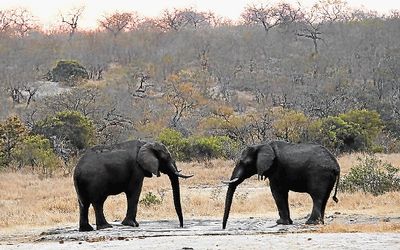PBS: Escaping Eritrea … [Read More...] about ካብ ውሽጢ ቤት ማእሰርታት ኤርትራ
Africa has hidden wealth in groundwater
BY KEMANTHA GOVENDER, MAY 12 2015, Business Daily (South Africa)
GROUNDWATER is a vital resource for Africa and its use can alleviate water shortages across the continent, says Prof Tamiru Abiye of the University of the Witwatersrand (Wits). Speaking at his inaugural lecture recently, the professor of hydrogeology said even regions such as North Africa, which receive little rain, are rich with groundwater. Libya has the continent’s most abundant supply of water stored inside rocks.

Abiye’s interest in this field of study began in his youth. “I was born and raised in the southern part of Ethiopia, where the only gold mine in the country is located (Adola). When I was at high school, I used to interact with geologists coming from the gold mine and doing regional mapping. “When I was a Grade 10 student my town got its first water supply borehole. It was during a summer break; I spent more than a week observing the borehole drilling and well completion processes.” Abiye deals with groundwater from a geological aspect, but says there is a need to understand it from different angles because of its multidisciplinary nature. Geo-hydrology focuses on the hydrological aspect of groundwater and differs from hydrogeology, which focuses on the role of rocks in controlling the occurrence of groundwater.
There is a vast amount of ground water across the globe, but few countries have developed the capacity to exploit it. “In Africa, groundwater storage is approximately 175 times bigger than surface water and the total groundwater storage in Africa equals 66-trillion cubic metres, which is more than 100 times estimates of surface water. This is something the politicians have not yet accepted,” Abiye says. “Surface water is not sustainable, can be easily polluted, easily evaporates and has no large spatial coverage.”
The South African private sector focuses on the business aspect of groundwater, with “no concerted effort aimed at the discovery of new major aquifers”, Abiye says. “Most groundwater professionals lack in-depth geological training. “Hence, these professionals cannot solve complex groundwater problems. Government departments have low levels of expertise and are poorly staffed.” Abiye says humans rely mainly on rivers and lakes as water sources but elephants can be considered “groundwater experts” because they know where to find it.
“Groundwater resources represent an essential part of climate change adaptation strategies. Its hidden nature and slow recharge process categorises it as resilient to climate change,” he says. It is a natural buffer against seasonal changes in temperature and rainfall. Abiye’s other area of interest is the effect on people of fluorosis, caused by an excess of fluoride. It is a common problem in SA. Rocks such as pumice, ignimbrite, volcanic ash and obsidian are major sources of fluoride in groundwater. Abiye says to tackle this issue one of two things can be done: the government can treat fluoride and provide drinking water, or it can identify rocks that contain low fluoride concentrations.
Some governments are listening to these suggestions.
It is appropriate that Wits leads knowledge in groundwater production, he says, because the name “Witwatersrand” refers to the groundwater that runs under the land on which it was built.
